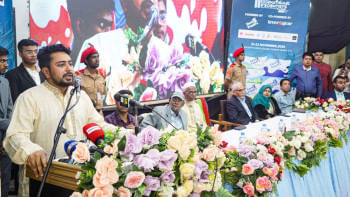Strong backs and magic fingers

Since its inception in 1985, the National Crafts Council of Bangladesh (NCCB), through its sincere efforts, has attempted to highlight the traditional crafts of the country to a wider audience. The Mastercarftsperson's Award –a part of that effort - is a regular event on their calendar, which acknowledges the achievements of distinguished individuals, bringing to light their lifelong contribution towards uplifting age-old traditions.
For 2016, the NCCB recognised the works of Sarat Mala Chakma and presented her with the Mastercraftspersons Lifetime Award 2016 at a ceremony held in Ganitbhaban of Dhaka University on December 24, 2016.
Distinguished guests attending the ceremony included Professor Emeritus Anisuzzaman; Sultana Kamal, the executive director of Ain o Salish Kendra; Professor Niaz Zaman; Chandra Shekhar Saha, President of the National Crafts Council of Bangladesh; Bibi Rassell, designer; Lipi Khandaker, artist; and others.
Born in 1932, Sarat Mala Chakma was brought up in Tabalchari Masterpara, Rangamati. Like any other female of the community she started weaving from a very early age. Traditionally Chakma women make their own clothes, and as a result almost every girl had to master the art of weaving. Sarat Mala was no different.
From the age of eight, this brilliant artisan started weaving her own clothes. Eventually she completed an 'alam' consisting of some intricate designs. 'Alam' is a sample book of traditional motifs and designs which is deemed important for learning the Chakma style of weaving.
Even after getting married, Sarat Mala's passion for weaving did not falter. Rather, using her dexterous fingers she started experimenting and wove patterns on curtains, scarves, sarongs, and blankets. Her greatest achievement however, is in using 'Ben', which is also known as 'komor taant' (or waist loom), a process of weaving garments using blackstrap loom.
In 'komor taant' the loom is attached on one end to a wall or a tree, with a rope and the other end is attached around the weaver's body. Intricate designs are created through this strenuous process, which requires the weaver to have a strong back.
Sarat Mala Chakma's ingenuity is also displayed through her weaving using rayon, something of a novelty in Chakma weaving techniques. Always open to ideas, she was capable of creating myriad designs in colourful patterns.
In the hope of spreading her skills to others, Sarat Mala actively encouraged and helped a multitude of women find work through the establishment of her organisation “Jummonbi,” which translates into 'skilled woman'. Through the eight years of its sustainability she and her workers have supplied clothes to many arts and crafts shops in Dhaka.
Sarat Mala Chakma has earned multiple awards and accolades nationally. At the international level, she had the rare privilege of being invited to the Commonwealth Institute in London and asked to demonstrate the ways of Chakma weaving, and her forte in particular. She has also exhibited in Italy.
Kanak Chanpa Chakma, her daughter and an exponent of modern Bangladeshi painting, expressed her gratitude for Sarat Mala Chakma's work being recognised. She said, “I am overjoyed by the appreciation and the acknowledgement towards my mother's hard work. She herself is very grateful and overwhelmed.”
Although creative minds like Sarat Mala Chakma have paved the way for a generation to get involved in promotion of their own culture, the art of weaving is going through tough times.
On that note, Kanak Chanpa Chakma said, “I think because of lack of appreciation and the meagre income of artisans, fewer people are engaging in this profession, which stands as a threat to the survival of the culture of the Chakma weavers.”
She further mentioned that the only way to bring back the golden age of such unparalleled creativity is to appreciate and value innovations of the artists. It is necessary for all people of the ethnic communities to learn about their own culture in order to carry on the legacy of craftsmen like Sarat Mala Chakma.
The Mastercarftsperson's Award 2016 was presented by the NCCB with the co-operation and support of the A F Mujibur Rahman Foundation.
By Mormee Mahtab
Photo courtesy: Kanak Chanpa Chakma


 For all latest news, follow The Daily Star's Google News channel.
For all latest news, follow The Daily Star's Google News channel. 



Comments